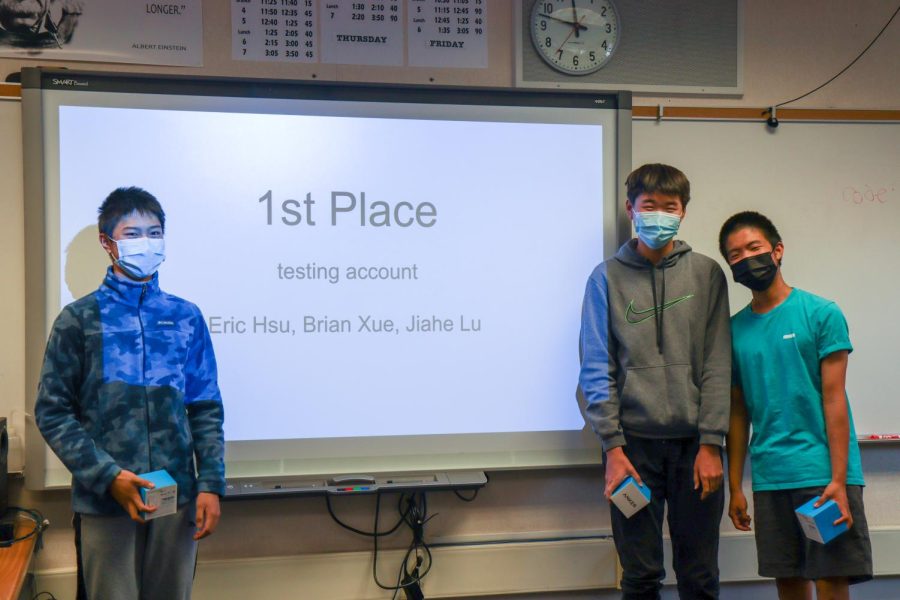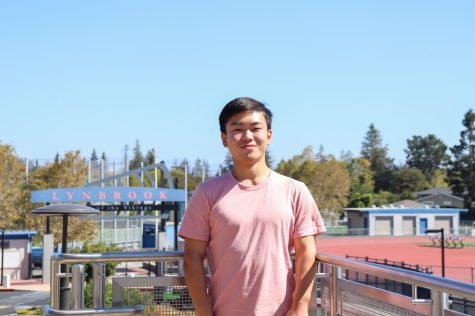Students compete in Lynbrook’s first-ever programming competition
Sophomores Eric Hsu, Jiahe Lu and Brian Xue take the first-place blue tooth speakers prize home at the first Lynbrook ProCo.
November 7, 2022
Students frantically typed up code and prepared submissions in the waning minutes of Lynbrook’s first-ever programming competition. Lynbrook ProCo, hosted in collaboration between the Computer Science and Web Development clubs on Oct. 23, consisted of 15 teams competing for prizes collectively worth more than $150. Sophomores Eric Hsu, Jiahe Lu and Brian Xue won the competition, freshmen Brian Law and Matthew Xia came in second place and freshman Aaron Ma trailed close behind in third.
In the competition, teams of up to four students were given a four-hour unproctored window to collaborate on solving 12 coding problems that were inspired by the USA Computing Olympiad. Each of the problems involved automating a task that required clever uses of algorithms and data structures. For example, one problem asked competitors to optimize the shortest distance between two axolotls on a number line, and another problem asked competitors to print the last sentence of a cow’s book. At the end, prizes were awarded to the three teams who correctly solved the most problems. The first-place winners won speakers, second place won laptop bags and third place won earbuds.
“My team came in with lots of prior competitive programming background,” first-place winner Xue said. “Even so, there was a scary moment when I thought I had the incorrect algorithm for a problem but my teammate, Eric, debugged it and explained how it was actually correct. It felt very, very nice knowing that we had solved every single problem.”
Computer Science Club handled the logistics of the competition, including writing a code of conduct and advertising on the morning announcements. The officers also created the problems and test cases that were used to score participants, helped by members senior Steven Pan and junior David Lee.
“As problem-writers, we would first come up with a list of topics we would test on, such as searching algorithms and optimization techniques,” Computer Science Club president and senior Ryan Chen said. “We would then pick unique topics and brainstorm problems with storylines, before cutting down to our 10 selected problems and writing solutions for them. It was hard work done in an accelerated timeline, but everyone still pulled through.”
Topics tested varied in difficulty and included binary search, dynamic programming and Dyjkstra’s algorithm, which are algorithms that involve pruning redundant operations while efficiently sifting through data points and identifying shortest paths. The problems required creative uses of these algorithms by modifying and extending them to fit a task’s need.
While Computer Science Club created the problems, Web Development Club made the ProCo website to serve as the competition’s submission platform. Participants were allowed to use any coding language of their choice and submitted their solutions through the website using their provided login credentials.
“Computer Science Club needed a website to display problems and receive answer submissions, but preexisting competition-hosting websites were privately run by universities and bigger companies,” said junior Anish Lakkapragada, Computer Science Club Secretary and Web Development Club Vice President. “We wanted to teach Web Development members how to create production-ready products using databases like PostgreSQL, APIs, and reactive frameworks while helping another club in the process.”
ProCo was designed to be friendly for competitors with little competitive programming experience by including approachable problems testing clever thinking. The contest had a large showing, evident by the 300 problem submissions on the website. Most teams submitted solutions to multiple problems, and the first-place team correctly solved all 12 problems.
“I hadn’t done much competitive programming before, so during the contest, I realized there were concepts that I didn’t quite know,” sophomore Karen Gao said. “After the contest, I felt inspired to look them up, so I learned more from ProCo than I would’ve thought.”
By making the competition accessible for the beginner competitive coding students, Computer Science Club and Web Development Club hoped to offer a taste of what programming competitions are like and encourage newcomers to get involved in competitive programming.
“In my five years as the Computer Science Club’s advisor, this is the first time the club has executed an idea of this magnitude this early in the year,” said Bradley Fulk, Computer Science teacher and Computer Science Club advisor. “There might be improvements to be made as we market future ProCos to the right audience, but in time we’re hoping we get more and more students introduced to competitive programming.”



































































